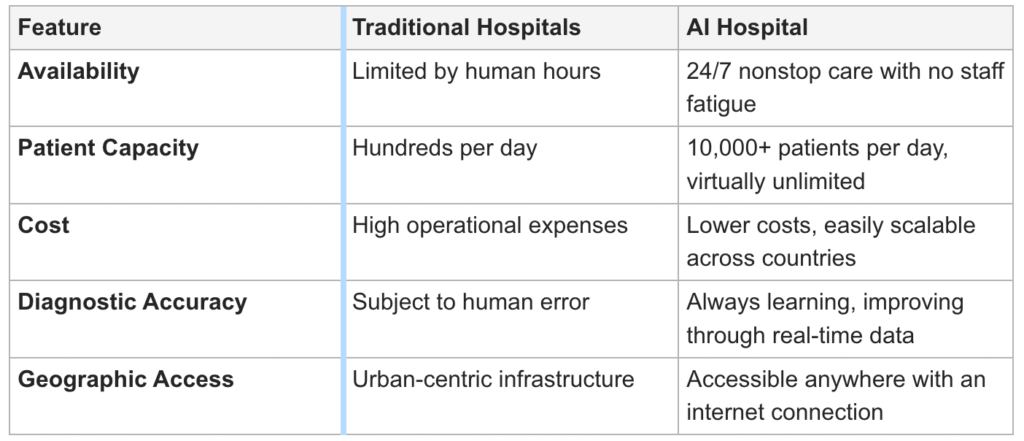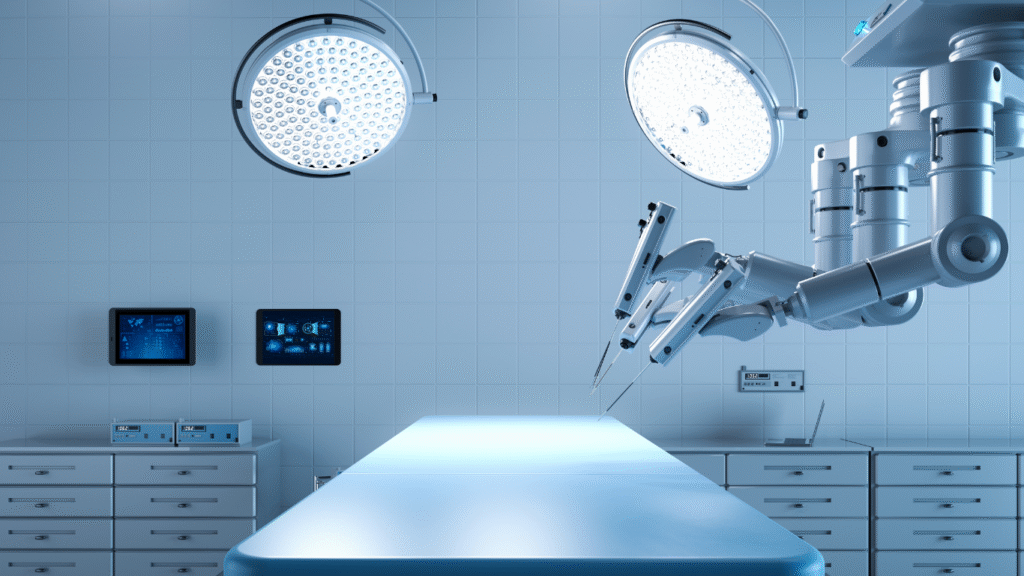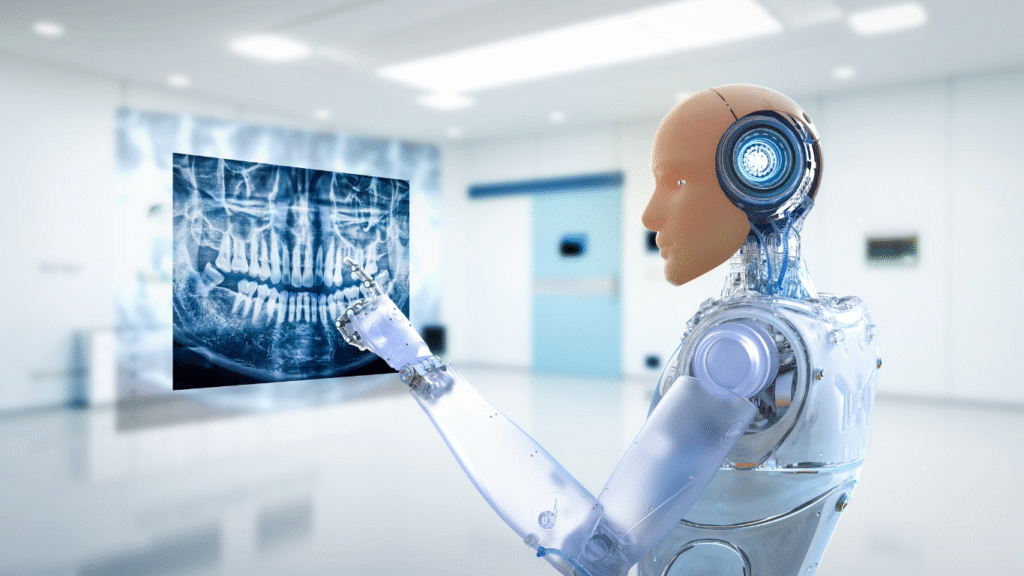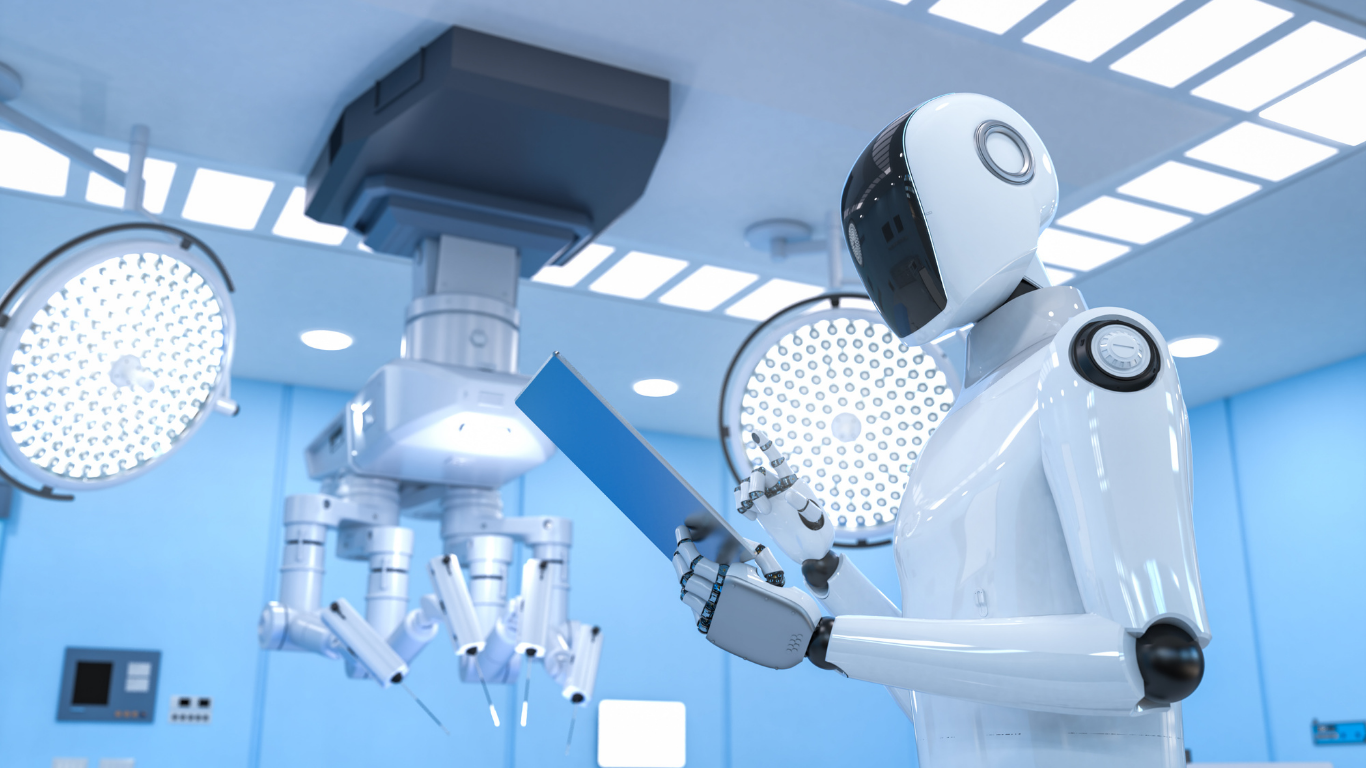Imagine walking into a hospital… Imagine being greeted by a doctor that never sleeps, never makes a mistake in diagnosis, and can treat thousands of patients simultaneously.
Does this seem like science fiction? Not anymore.
China has officially launched the world’s first AI hospital, which is likely to change the way we think about healthcare forever.
What Is an AI Hospital?
Tsinghua University researchers created an AI hospital that not only aids human doctors but also replaces them in virtual simulation. The system, which includes 14 real-world departments, can handle 10,000 patients every day, perform diagnoses, prescriptions, follow-ups, and emergency care, and participate in real-time conversations via advanced LLMs.
Yes, you read it correctly. It can communicate, diagnose, and treat in the same way that a real doctor does, but faster and smarter.
This AI hospital features a robust LLM trained on medical datasets, capable of understanding complex medical histories, asking diagnostic questions, recommending treatments with clinical-level accuracy, and learning and improving with each patient interaction.

Why This Is a Big Deal: The AI Hospital vs. Traditional Healthcare

What Makes This AI Hospital So Revolutionary?
China has officially launched the world’s first fully AI-operated hospital, capable of treating up to 10,000 patients a day—all without human doctors. While it may sound like science fiction, this innovation marks the beginning of a new era in medicine where artificial intelligence becomes central to how healthcare is delivered.
AI hospitals use large language models to diagnose illnesses, prescribe treatments, conduct patient follow-ups, and handle complex queries in real time, revolutionizing traditional healthcare operations.
AI Hospitals: 24/7 Care
• Provides 24/7 care, including weekends and holidays.
• Crucial for emergencies, especially in remote or underserved areas.
AI Hospitals: Scaling Up
• AI hospitals can consult and diagnose 10,000+ patients daily.
• Scaling up doesn’t require more buildings; it requires more servers.
• Get care quicker with shorter wait times.
AI Hospital Cost-Effectiveness
• Reduces overheads compared to traditional hospitals.
• Scalable to national levels without major infrastructure.
• Provides affordable healthcare, especially in rural and low-income regions.
AI in Doctors’ Diagnostics
• AI uses new data to get better at diagnosis.
• Can reference thousands of case studies in seconds.
• Reduces misdiagnosis and improves early detection, crucial for diseases like cancer or heart conditions.
AI Hospital Bridging Urban-Rural Divide
• Internet-based hospitals bridge the urban-rural divide.
• Accessible from smartphones or small rural clinics.
• Potential for billions outside cities to access quality care.
China’s smart hospital shows how healthcare could be quick, easy, and available to everyone. It’s not a doctor replacement thing, it’s about expanding their abilities.AI hospitals will handle high-volume tasks, while human doctors focus on empathy, ethics, and complex decision-making.
This new tech is huge—a real lifeline for the future of healthcare.
Real-World Impact
1. Rural & Remote Access:
The development of remote healthcare access will enable millions of people in rural China and globally to access healthcare without the need for a nearby hospital.
2. Pandemic Preparedness:
AI hospitals can effectively handle large-scale triage in the event of future pandemics, thereby reducing human exposure and hospital overcrowding.

3. Training & Simulation:
This platform is being utilized by medical students and AI researchers to simulate rare medical scenarios, which are nearly impossible in real life.
Is This the End of Human Doctors?
The rise of AI hospitals—like the one China just launched—has sparked a mix of excitement and anxiety. Some are calling it the beginning of a healthcare revolution. Others worry it might mean the end of traditional medical professions.
Here’s the truth: AI won’t replace doctors—but doctors who use AI will replace those who don’t. Let’s break it down:
1. AI Handles Repetition, Not Complexity:
AI excels at repetitive tasks like symptom checking and patient record management but struggles with complex patient care, emotional considerations, moral decision-making, and real-time adaptation, lacking empathy.
2. The Human Touch Still Matters:
Trust is crucial in healthcare, as doctors provide comfort, reassurance, motivational support, and physical interaction, while AI can simulate conversation but cannot replicate compassion or gut instincts.

3. AI as a Medical Co-Pilot:
AI can enhance doctors by double-checking diagnoses, providing instant second opinions, prioritizing critical cases, and reducing paperwork, resembling a future stethoscope rather than a competitor.
4. Global Healthcare Gap:
The WHO predicts a global healthcare shortage of over 10 million workers by 2030, with AI hospitals potentially filling these gaps by scaling care delivery, providing 24/7 assistance, and handling pandemic surges.
5. Ethics, Responsibility & Accountability:
AI’s failure to address legal frameworks, ethical reasoning, and accountability structures leaves doctors as the final authority in patient care.
AI-augmented medicine is set to revolutionize healthcare, requiring highly skilled doctors to understand AI tools and combine clinical expertise with digital intuition.
Final Thoughts: The Future of Hospitals
China’s AI hospital is a technological milestone. It offers a glimpse into the future of global healthcare. Aging populations, rising chronic diseases, and doctor shortages highlight the potential need for AI-powered hospitals.
This breakthrough demonstrates that medicine can be more scalable, accessible, and intelligent than ever before. While human doctors will always play an important role in treatment, AI systems can handle millions of consultations, save costs, and reach parts of the world that traditional healthcare cannot.
In a society demanding faster, fairer, and more efficient solutions, AI hospitals may soon become the rule rather than the exception.
The big question now: “Would you trust an AI doctor with your health?” Let us know in the comments.



